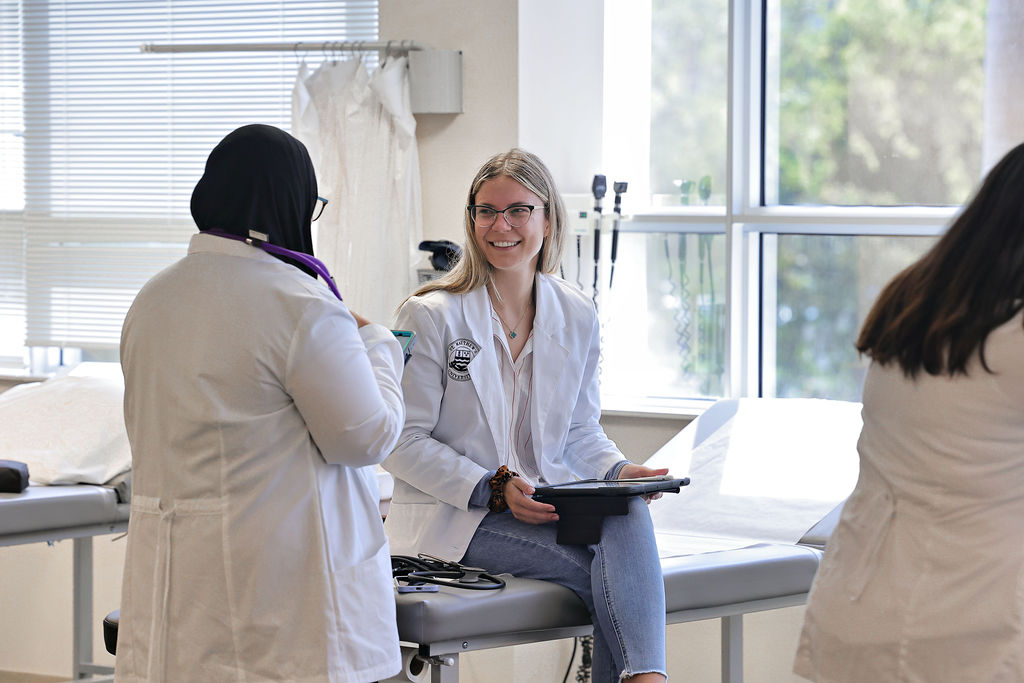
What MCAT Scores Are Needed for Medical School: MCAT Score Range Explained
Learn about MCAT testing, scores and requirements, including what you should aim for as part of a successful med school application.
The Medical College Admission Test (MCAT) is an important part of the medical school admissions process. It’s designed to assess a student’s knowledge of the sciences, critical thinking skills and writing ability. Due to the significant impact of MCAT scores on medical school admissions decisions, it is important for students to understand what scores are required to get accepted into a top medical school.
So, what’s a good MCAT score? In this article, we’ll explore the MCAT scores accepted by medical schools and outline the steps you can take to improve your chances of acceptance.
More information about the MCAT is available at the Association of American Medical Colleges (AAMC).
What Is the MCAT Score?
Your MCAT score reflects how well you did on all four sections of the test, and your percentile ranking reflects how well you performed on the MCAT compared to other test-takers. Your MCAT score plays a significant role in the admissions process and can be a make-or-break factor when securing a spot in a comprehensive MD program. Achieving a strong MCAT score will provide a distinct advantage; therefore, it is essential to do your best on the exam.
What Are the MCAT Sections?
The MCAT consists of four sections. Here is the MCAT sections breakdown:
- Biological and Biochemical Foundations of Living Systems – This section explores processes unique to living organisms, such as growth, reproduction and homeostasis.
- Chemical and Physical Foundations of Living Systems – Topics in this section include organic chemistry, biochemistry, general chemistry and physics.
- Psychological, Social and Biological Foundations of Behavior – This section focuses on psychological, sociological and biological concepts that influence behavior and health.
- Critical Analysis and Reasoning Skills (CARS) – This section assesses critical reading and analytical skills, examining the ability to analyze and evaluate complex texts.
Knowledge in each discipline is key to scoring well on the MCAT, so it is important to learn, study and practice all topics covered in each section.
How Is the MCAT Scored?
The total MCAT score ranges from 472 to 528, with a mean score of 500. Your percentile ranking reflects how well you did relative to other test-takers. For example, if your ranking was in the top 10%, you scored better than 90% of the students who took the test.
The use of a scaled system ensures fairness and consistency in the analysis of student performance. With no penalty for incorrect answers, students are encouraged to answer all questions to maximize their chances of success.
Those who take the MCAT will also receive a percentile rank for each section. This shows you the percentage of other test-takers who scored the same or lower in each section and overall.



What Are the Individual MCAT Score Ranges?
The MCAT score range for each section is from 118 to 132, contributing points toward your total score for each tested subject area. An overall combined score is then calculated by averaging your performance across all four sections. This makes it essential to perform well across all MCAT sections to achieve a good overall score.
With a median score of 125 for each section, the overall MCAT median score is 500, which is generally viewed as the average MCAT score for medical school targeted by test-takers.
What Are the MCAT Percentiles?
Percentile scores show what percentile range your score falls in – for example, a percentile rank of 70 means that you scored better than 70% of the test takers. Medical school admissions officers use percentile scores to compare your results with other applicants who took the same exam.
It’s important to note that percentiles are contextual and subject to changes over time. It’s more beneficial for applicants to focus on their actual scores rather than using percentiles as a benchmark.
What Is the Highest MCAT Score?
The highest total MCAT score is 528, and the highest MCAT score per section is 132. In terms of percentile rankings, the highest percentile is 99+, which means you scored better than 99% of test-takers.
What Is the Average MCAT Score?
According to the AAMC, the average MCAT score for all test-takers from May 2023 to April 2024 was 501, with a mean of 125 per section.
What Is a Good MCAT Score to Have?
A good MCAT score is generally any score that falls in the 50th percentile or higher, indicating you performed better than at least half of the other test-takers. Depending on the medical school you are applying to, some may require higher scores than others. Researching and understanding each school’s admissions process and desired scores is essential.
How Does My GPA Measure Up Against the MCAT Test?
If your GPA is lower than average, your MCAT score could determine whether you get accepted into medical school. A higher MCAT test score can demonstrate to medical schools that while your academic performance may not have been stellar during undergraduate studies, you still have the knowledge and skills necessary to succeed in the field of medicine. On the other hand, if your GPA is higher than average, you may have more flexibility in the medical school admissions process.
Does My Medical School Acceptance Depend Solely on a Good MCAT Score?
No, MCAT scores are just one factor in the complex landscape of medical school admissions. Medical schools will also look at many other aspects of your application, including:
- GPA: Good grades throughout your undergraduate studies can demonstrate that you have the necessary knowledge and skills to succeed as a medical student.
- Letters of recommendation: Having someone vouch for you with a well-written letter of recommendation is essential to demonstrating your character and capabilities to admissions officers.
- Clinical experience: Volunteer or clinical experience in the medical field demonstrates your commitment to the profession and increases your chances of getting into medical school.
- Undergraduate coursework: Showcasing coursework that highlights your academic prowess can also be a great way to demonstrate your capabilities to medical school admissions officers.
- Medical research experience: Participation in medical research can demonstrate your commitment to the field. For example, if you have conducted research in a lab or published papers, this could be viewed favorably by medical school admissions officers.
- Extracurricular activities: Showcasing any relevant extracurricular activities or leadership positions you’ve held can also help strengthen your application. This could include working as a tutor, volunteering in the community or participating in professional societies.
- Personal statement: A well-thought-out personal statement provides an opportunity to showcase unique qualities and experiences that you may not be able to demonstrate through test scores or grades alone. An impressive personal statement can make all the difference.
What MCAT Score Do I Need to Get Into St. Matthew’s University School of Medicine?
There is no minimum MCAT score requirement at St. Matthew’s University School of Medicine for our Doctor of Medicine (MD) program. This is because we evaluate applicants holistically and look at their overall academic merit, in addition to other factors that are important in assessing a student’s potential. While there’s no specific minimum MCAT score range, aiming for a high score will help you showcase your knowledge and skills to our admissions committee.
Please note that submitting MCAT scores is an application requirement for all U.S. students and is strongly recommended for all other applicants as well.
Learn More About St. Matthew’s University School of Medicine (SMUSOM)
Established in 1997, SMUSOM’s legacy includes 2,300+ Doctor of Medicine (MD) program graduates. Alumni go on to hold licenses and practice medicine in the U.S., Canada and internationally.
Thanks to our strong curriculum, dedicated faculty and early hands-on training opportunities, SMUSOM students are well-equipped to succeed in USMLE examinations, excel during their U.S. (core and electives) and Canadian (select electives) clinical rotations, and secure residency placements post-graduation.
Located on safe and modern Grand Cayman (part of the Cayman Islands), SMUSOM students quickly feel comfortable and ready to take full advantage of their medical education!
Learn more about the St. Matthew’s University student experience in this video testimonial:
We also encourage you to contact us if you have any admissions or other questions, or start the process by learning how to apply!
FAQs About the MCAT
The MCAT score ranges from a minimum of 472 to a maximum of 528, with a mean score of 500. The average MCAT score for all test-takers from 2023-2024 was 501. Generally speaking, achieving 500 or higher means you have outscored approximately half of other test-takers, which is a positive outcome.
Whether an MCAT score is required as part of your application to medical school will depend on the specific admissions requirements of the school in question, as well as your own country of origin. At St. Matthew’s University, the MCAT is only required for U.S. students, although it is recommended for all.
In general, students can take the MCAT in January and from March to September of each year. The standard start time is 8:00 a.m. on test days. Scores are released by 5:00 p.m. ET on the scheduled score release date. Learn more on the MCAT schedule webpage.
There are options to consider if you earn an MCAT score that you find unsatisfactory. The first would be to re-take the test if you have time to do so. However, before choosing this option, be sure you have enough time to study effectively and address the areas that you found challenging initially. Because the MCAT is only offered during certain periods of the year, this may not be feasible for every aspiring med student. In this case, you should make sure the other portions of your application (letters of recommendation, personal statement, etc.) are strong. You can also address your MCAT score in your statement and during interviews, to highlight the challenges you faced and what you learned from the experience. Remember, at St. Matthew’s University, we consider applications holistically and a relatively low MCAT score does not necessarily mean you will be unsuccessful as a candidate.